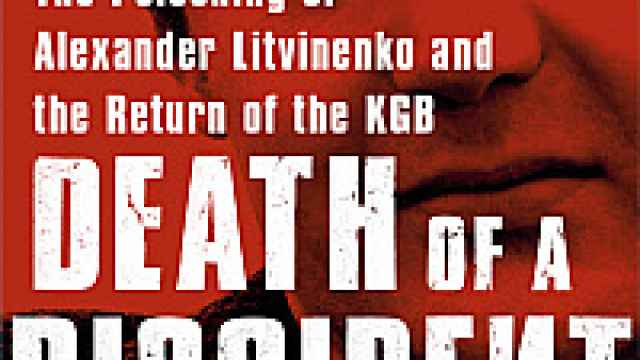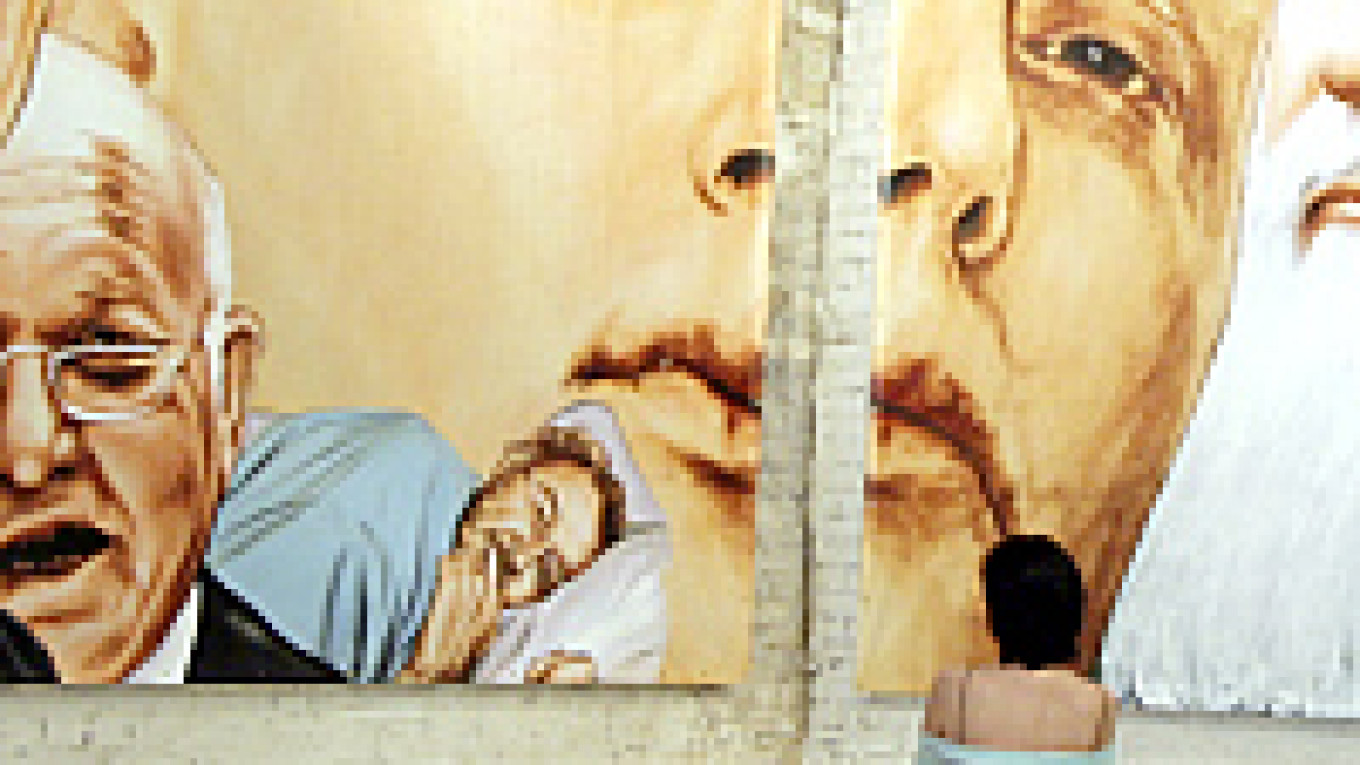"Imagine their faces when they read this in Kontora," Litvinenko said, referring to the FSB, his old agency.
"I'd give a lot to see Volodya's face when he reads it," Berezovsky said, referring to President Vladimir Putin.
Alex Goldfarb, Berezovsky's right-hand man, recalls these near-identical comments in "Death of a Dissident," his own new book on Litvinenko's murder by polonium in London last November. Goldfarb was struck that Litvinenko and Berezovsky said almost the same thing to him separately, underscoring the fact that the apartment-bombing book was more political weapon than investigative report. "For them," Goldfarb now writes, "the book was not aimed at the general public; it was not supposed to prove anything. It was a personal message to their nemeses, a declaration of war: We think you did it, and we are out to get you."
The same might be said of Goldfarb's new book. He and Berezovsky are once again sending a message to Putin, declaring war and vowing to get him. Just as Litvinenko's book did not prove anything, neither does this volume. But it serves Berezovsky's purpose of putting Putin in the dock of international public opinion, charged with the sensational killing of a critic through what Litvinenko's father called "a tiny nuclear bomb" planted inside the former FSB officer's body.
Although theoretically about the Litvinenko murder, the book is more a chronicle of Berezovsky's political machinations through the 1990s, his alliance and breakup with Putin around the turn of the century and his campaign against the Kremlin from European exile ever since. Litvinenko, the ostensible protagonist, plays a largely secondary role in Berezovsky's melodrama until the final 34 pages, when Goldfarb finally gets around to the story of his murder. Marina Litvinenko, his widow, is given co-author credit, but in fact the book is written in Goldfarb's voice.
 Free Press Death of a Dissident: The Poisoning of Alexander Litvinenko and the Return of the KGB By Alex Goldfarb with Marina Litvinenko Free Press 384 pages. $27 | |
Take, for example, the beginning of the rupture between Putin and Berezovsky. As Berezovsky has explained it, the oligarch objected to Putin's plan in 2000 to toss elected governors out of the Federation Council, effectively making the upper house of parliament more subservient to the Kremlin. Berezovsky once told me in an interview that he and Putin got into a bidding war bribing State Duma members for their votes on the issue. The Kremlin offered $5,000 per vote, Berezovsky said, so he offered $7,000.
In Goldfarb's version, history is scrubbed; the bidding becomes merely a hypothetical discussion when Putin says he will submit his plan to the Duma. "Come on, Volodya," Berezovsky tells him, "I know how things are in the Duma. It's $5,000 per vote. I can go out and start paying $7,000. This would not be a debate on substance."
Goldfarb also advances, without irony, Berezovsky's long-held argument that oligarchs are not robber barons out for themselves, but "intrinsically pro-democratic" and natural opponents of communists. "They are the best guarantors of freedom," Goldfarb writes, channeling Berezovsky. "In other words, what is good for LogoVAZ is good for Russian democracy."
Putin, by contrast, is an ominous KGB figure who keeps a bronze statuette of Soviet security-police founder Felix Dzerzhinsky on his desk and vows revenge on Litvinenko for blowing the whistle on FSB corruption and betraying the brotherhood. "Putin is Kontora's man, body and soul," Goldfarb quotes Litvinenko as saying. When Litvinenko is prosecuted, it is portrayed as Putin's personal handiwork. "He always hated me," Litvinenko says. Berezovsky quotes Putin calling Litvinenko "a traitor."
Still, this being Berezovsky, there are some priceless moments. At one point, he's in Chechnya resolving a hostage crisis by giving his $50,000 watch to a Chechen militant. And then there's the time Berezovsky and Putin are talking in a secure room at the FSB when the lock breaks. "Hey, someone!" Putin shouts as he bangs on the door. "This is Putin here! We are locked out!" It takes 10 minutes before someone frees them.
But broadly, the world Goldfarb describes is dark and menacing. Goldfarb reminds us of the allegations Litvinenko made in his famous 1998 news conference before being jailed and, eventually, fleeing to the West -- how the FSB wanted to frame dissident agent Mikhail Trepashkin, kidnap Chechen businessman Umar Dzhabrailov and kill Berezovsky. One of Litvinenko's FSB superiors holds up the memoir of the NKVD official who orchestrated Leon Trotsky's assassination and declares, "This is our role model!"
What remains murky is why, all these years later, Putin or anyone else would still want Litvinenko dead. Goldfarb describes Andrei Lugovoi, accused of the crime by Scotland Yard, as a former Berezovsky security director who did business with Litvinenko. But there is precious little exploration of their relationship and no theory offered about why he might want to kill Litvinenko -- only the supposition that someone must have forced him to.
In the world of conspiracy theories, of course, supposition is enough. No matter how wild, no matter how implausible, someone obviously did kill Alexander Litvinenko with polonium-210. It sounds like the movie it seems destined to become, with Hollywood racing to film big-screen versions of "Death of a Dissident" and the forthcoming "Sasha's Story: The Life and Death of a Russian Spy" by New York Times London bureau chief Alan Cowell.
Yet none of that really unravels the riddle. As Goldfarb acknowledges, many will believe the allegation that Berezovsky and British intelligence were actually behind Litvinenko's murder, all to make poor Russia look bad. "Without a judicial conclusion, Sasha's murder will turn into a zero-sum game between the two conflicting conspiracy theories, each the mirror image of the other," Goldfarb writes. "On the two ends of the hall of mirrors -- with Sasha's body in the center -- are the two main protagonists of this story, Boris and Putin, one the nemesis of the other. One of them did it. The choice is in the eye of the beholder."
That's the problem with conspiracy theories in Russia. Too often they're true. It's just hard to know which one.
Peter Baker is a former Moscow correspondent for The Washington Post and a co-author, with Susan Glasser, of "Kremlin Rising: Vladimir Putin's Russia and the End of Revolution."
A Message from The Moscow Times:
Dear readers,
We are facing unprecedented challenges. Russia's Prosecutor General's Office has designated The Moscow Times as an "undesirable" organization, criminalizing our work and putting our staff at risk of prosecution. This follows our earlier unjust labeling as a "foreign agent."
These actions are direct attempts to silence independent journalism in Russia. The authorities claim our work "discredits the decisions of the Russian leadership." We see things differently: we strive to provide accurate, unbiased reporting on Russia.
We, the journalists of The Moscow Times, refuse to be silenced. But to continue our work, we need your help.
Your support, no matter how small, makes a world of difference. If you can, please support us monthly starting from just $2. It's quick to set up, and every contribution makes a significant impact.
By supporting The Moscow Times, you're defending open, independent journalism in the face of repression. Thank you for standing with us.
Remind me later.


